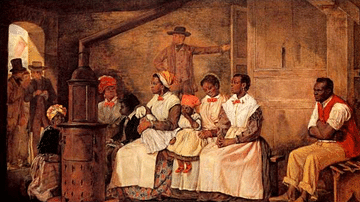Review

| Rating: | |
|---|---|
| Title: | In Miserable Slavery: Thomas Thistlewood in Jamaica 1750-1786 |
| Author: | D. G. Hall & Douglas Hall |
| Audience: | General Public |
| Difficulty: | Medium |
| Publisher: | University Press of the West Indies |
| Published: | 1998 |
| Pages: | 348 |
"In Miserable Slavery: Thomas Thistlewood in Jamaica 1750 - 86" is a detailed account of the life of Thomas Thistlewood, an Englishman who moved to Jamaica in the mid-18th century and became a plantation overseer and later a small-scale landowner. The book provides valuable historical insight into the lived experience of both enslaved Africans and their oppressors, making it a significant contribution to our understanding of the history of chattel enslavement in the Caribbean.
In Miserable Slavery: Thomas Thistlewood in Jamaica 1750-86 is a detailed account of the life of Thomas Thistlewood, an Englishman who moved to Jamaica in the mid-18th century and became a plantation overseer and later a small-scale landowner. This book is a meticulous collection of thoughts and daily occurrences as outlined in Thistlewood’s diaries, which provide a rare and brutally honest insight into the daily operations of chattel enslavement in British colonial Jamaica.
The book provides a microhistory of the Trans-Atlantic trafficking of enslaved Africans, offering a rare and intimate look at the personal motivations, behaviour, and outlook of a colonial overseer who was fully immersed in the institution of slavery. It also provides significant historical, socio-political, and economic lenses through which readers can have a deeper understanding of the prevailing norms and atrocities of 18th-century life that surrounded chattel enslavement. It sheds light on that era as a period of intense political conflict and great unrest stemming from the constant threat of uprising from enslaved Africans such as the Tacky's War/Rebellion of 1760. The book provides valuable historical insight into the lived experience of both enslaved Africans and their oppressors, making it a significant contribution to our understanding of the history of chattel enslavement in the Caribbean.
Divided into eleven chapters, In Miserable Slavery chronicles Thistlewood’s life beginning with his origins in Lincolnshire, England, exploring his journey and settlement in Egypt, Westmoreland, Jamaica. The book uses intriguing details to describe Thistlewood's labour, loves, fears, frustrations with the economy, self, and others to leave readers eager for more of this history. The book illustrates how Thistlewood treated enslaved Africans solely as property without humanity though restlessly aware of their capacity to retaliate and brutally punish them for what he perceived as disobedience, escape attempts, or simply his need to assert his dominance. The book does not shield readers from the uncomfortable experiences of the time, as Douglas Hall is careful and committed to maintaining historicity by recounting the exact phrases, considerations, and emotions detailed by Thistlewood's diary associated with even the most heinous of acts against enslaved Africans. Some acts included merciless flogging, chaining, rubbing salt pickle and bird pepper into the wounds of the enslaved Africans, and psychological torture. One of the most notorious examples from his diaries is the “Derby’s dose,” where he forced enslaved Africans to defecate into each other’s mouths as a form of punishment. The diaries also document Thistlewood’s gross sexual exploitation of enslaved women, which was a common practice among white men in the Caribbean at the time. He regularly assaulted and raped women on the plantation and recorded the encounters in his diary in a detached, unemotional, matter-of-fact manner.
Through Hall’s compilation of Thomas Thistlewood’s records, readers are led to an introductory understanding of the characteristics of plantation slavery, colonial Jamaica, and by extension, the British colonised Caribbean in the 18th century as defined by extreme violence, exploitation, and inhumanity, with plantation owners and overseers like Thistlewood exerting unhindered power and dominance over the lives of enslaved people. It is a painfully enlightening book permeated by English language, colloquialisms, and slurs reflecting the time, literacy, and opinions of Thistlewood and his companions. The author uses a formal and direct tone that is useful for unequivocally underscoring the diarist’s original meanings and thoughts and it is void of Hall’s personal opinions and analyses of Thistlewood’s writing - a commitment to maintain its authenticity.
Douglas Hall, Professor Emeritus of History at the University of the West Indies, Mona, Jamaica also wrote Free Jamaica 1838-1865 (1959) and Five of the Leewards 1834-1870 (1971). This book is an essential read for history enthusiasts, history professors, Caribbean academics, and generally anyone desirous of directly interacting with the jolting, unfiltered occurrences of an 18th-century plantation in the Caribbean.
About the Reviewer
Cite This Work
APA Style
Onfroy, A. C. (2024, October 29). In Miserable Slavery: Thomas Thistlewood in Jamaica 1750-86. World History Encyclopedia. Retrieved from https://www.worldhistory.org/review/479/in-miserable-slavery-thomas-thistlewood-in-jamaica/
Chicago Style
Onfroy, Ashleigh C.. "In Miserable Slavery: Thomas Thistlewood in Jamaica 1750-86." World History Encyclopedia. Last modified October 29, 2024. https://www.worldhistory.org/review/479/in-miserable-slavery-thomas-thistlewood-in-jamaica/.
MLA Style
Onfroy, Ashleigh C.. "In Miserable Slavery: Thomas Thistlewood in Jamaica 1750-86." World History Encyclopedia. World History Encyclopedia, 29 Oct 2024, https://www.worldhistory.org/review/479/in-miserable-slavery-thomas-thistlewood-in-jamaica/. Web. 25 Apr 2025.




